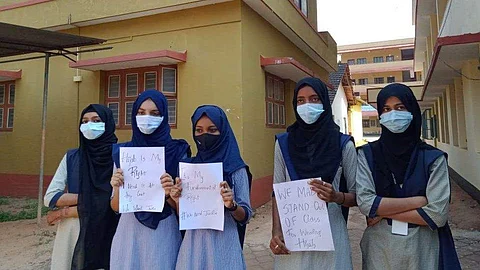

The Supreme Court will pronounce its verdict on the Hijab row which has been gaining steam in Karnataka since the Karnataka High Court judgement upholding the ban on hijab in educational institutions of the state. During the court cases that ensued, several arguments made by the counsel appearing for the petitioner as well as the state, grabbed eyeballs.
The state government's order of February 5, 2022 by which it had banned wearing clothes that disturb equality, integrity and public order in schools and colleges, was referred to in the apex court.
“Right to undress”?
Senior Advocate Devadatt Kamat, who was appearing for the petitioners, argued that the Government Order violates the fundamental rights of students under Articles 19, 21 and 25 of the Constitution of India, as per a report by LiveLaw. He added that the right to freedom of expression under Article 19 also includes dress. To this, Justice Hemant Gupta remarked, “You can't take it to illogical ends. Right to dress will include the right to undress also?" as per LiveLaw.
Essential Religious Practice
Karnataka's Advocate General (AG) Prabhuling K Navadgi said that countries like France have prohibited hijab and the women there have not become any less Islamic. He argued further that unless it is shown that wearing the hijab is compulsory and an essential religious practice (ERP), one cannot get protection under Article 25 of the Constitution, which deals with freedom of conscience and free profession, practice and propagation of religion.
Uniform dress code
The Supreme Court on September 16, refused to entertain petitions seeking a uniform dress code in all schools across the country. The petition was filed by Advocate Ashwini Upadhyay in the wake of the Karnataka hijab row. The plea said that a uniform dress code is needed to “instil a sense of camaraderie among students from different caste, creed, faith, religion, culture and place,” as pointed out by reports.
Matter of privacy
Advocate Shoeb Alam argued that wearing Hijab is a matter of one's dignity, privacy and autonomy. "On one end, I have my right to education, right to go to school, right to get inclusive education with others. On the other hand, there is my other right, which is right to privacy, dignity and autonomy," he said, as per PTI.
Alam said the impact of the government order (GO) banning hijab in educational institutions with prescribed uniforms is that, "I will give you education, give me your right to privacy, surrender it. Can the State do it? The answer is an emphatic 'no'." He said the State cannot come up with a GO asking a person to surrender her right to privacy at the doorstep of the school.
Drop out of students
"Do you have those authentic figures that because of this hijab ban and the subsequent judgement of the high court, 20, 30, 40 or 50 students have dropped out?" a bench of Justices Hemant Gupta and Sudhanshu Dhulia asked after the counsel appearing for one of the petitioners raised the issue of students, especially girls, dropping out of school, as stated in a report by PTI.
Senior advocate Huzefa Ahmadi, representing one of the petitioners, referred to a report that had testimonies of several students. "My friend (one of the lawyers) informed me that 17,000 students had really abstained from the exams after this particular judgement," he said to the bench.
